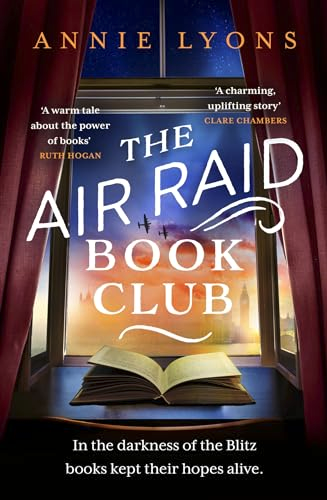The Air Raid Book Club by Annie Lyons – A moving novel of lives, books and reading in a challenging time

The Air Raid Book Club by Annie Lyons
It is not often that I found myself so deeply moved by a novel, but this well written book evoked that sort of response. It takes as its theme that reading and books, if possible in the company of others, can improve and even change lives, and in the context of this book it is vital. The book opens in 1938 and proceeds through a war that separates families and friends and causes danger and death. The air raids of the title are the London Blitz which means for the first-time fighting is brought home to people on the Home Front. The main character, Gertie Bingham, is still trying to come to terms with the death of her beloved husband Harry some two years before, but as much as Lyons describes her devastation, the book is not a wallow in her sadness. Her ownership of a bookshop and the support of a very special teenager and friends means that Binghams’ bookshop will play a part in a very tough time and be the focus for many people. While this is the aspect of the book that first attracted me, I found the descriptions of Gertie and her progress the most effective. This is a book about the power of books to draw people together when they become the focus of joint reading and discussion, a way of escaping difficult circumstances. It is also an honest account of the difficulties of a refugee girl and how she longs for her family, as well as an encouraging story of how almost a new family gathers around her in the most extreme of circumstances.
At the start of the novel in London, 1938, Gertie is still felling the sadness of losing Harry, and is struggling to maintain interest in her successful bookshop. She is assisted by the invaluable young Betty, but other people who help with the shop and the attached Book Club are proving more difficult. She is also still missing her parents and beloved brother Jack, who was killed in the First World War. She still has her redoubtable Uncle Thomas, a renowned and kindly, if slightly eccentric bookseller, who supports her. Her friend Charlie, a loyal friend of Harry, still appears in her life, and it is through his charitable work that she is persuaded to accept a Jewish child who is already at risk in Germany from the growing Nazi persecution. As she is sad that she was not able to have a child herself during her marriage, she is torn, especially when she discovers that Hedy is fifteen and deeply troubled, and it is not easy to establish a relationship despite her best efforts. As War comes closer, Gertie, Hedy, Betty and others discover that this is going to be a very different conflict from the all too recent previous War, and that while men will still be called away, there will be danger in London itself.
An element of this book that I particularly enjoyed is the book titles that are being sought out and relished in such difficult circumstances. While “Gone with the Wind” is perhaps better known as a film today, the book then was a particular favourite. P.G Wodehouse’s humour and subtle political parodies are popular, as well as Du Maurier’s “Rebecca” as distractions from the challenges of daily life.
Lyons has brought to life people in fascinating time in the twentieth century, and laced the effective story with honesty and real feeling. I found this book an excellent read and recommend it to book lovers as well as those who enjoy a well written wartime story.


